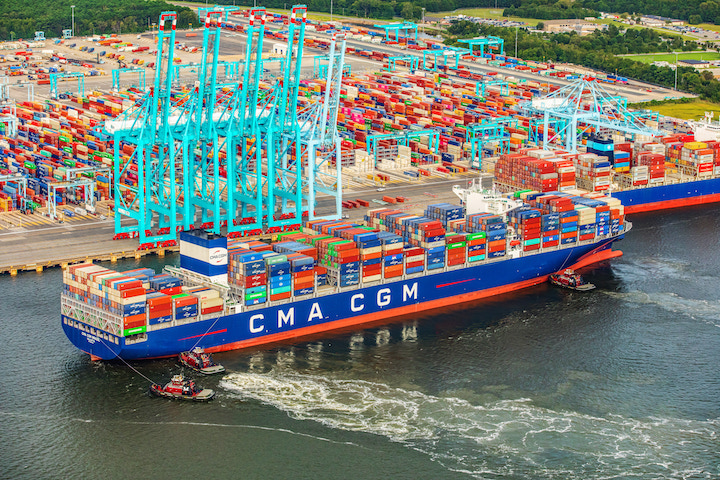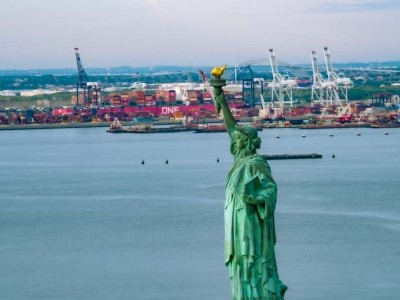Biggest vessel in Port of Virginia’s history calls; 15,000-plus-TEU CMA CGM Brazil
Sep 15, 2020At more than 1,200 feet long and nearly 170 feet wide, the containership CMA CGM Brazil is massive. It is more than 100 feet longer than most U.S. Navy aircraft carriers and is bigger than any containership to call The Port of Virginia® or come to the U.S. East Coast.

“We invested $800 million over the last two-and-a-half years to expand and modernize our terminals in order to handle ships of this size,” said John. F. Reinhart, CEO and executive director of the Virginia Port Authority. “We are talking to several ocean carriers about even bigger vessels, so this will be a good test for us. The ocean carriers have taken note of the work we are doing here and they know of our reputation for efficiency. Things are really coming into focus for The Port of Virginia.”
On Tuesday morning, the CMA CGM Brazil was brought alongside the berth at VIG and during the course of her 24-hour stay in Virginia; multiple labor shifts handled nearly 2,700 containers of exports and imports (combined). On average, most vessels are here for 12-14 hours.
The vessel can carry up to 15,072 TEUs (twenty-foot equivalent units) and eclipses the old record by more than 700 units. It is operated by the CMA CGM Group, a France-based shipping and transportation company; its ships serve 19 US ports with 93 weekly port calls.
The visit of the CMA CGM Brazil, the vessels in its size class, and even bigger ships highlight the importance of the deepening and widening of the Norfolk Harbor and its commercial channels, which are currently 50 feet deep. The port is dredging the harbor to 55 feet deep and widening the channels; when the work is complete in 2024, Virginia will hold the title of deepest port on the U.S. East Coast.
“We are following the trends, but more importantly, we are listening to our customers and the cargo owners moving their goods over our port,” Reinhart said. “They are telling us, very clearly, they will be introducing bigger ships into their services that are going to require 55-foot channel depths and that we must be able to handle multiple big ships and process increasing cargo volumes simultaneously.
“We have that capacity above-the-waterline – in our terminals -- and now we are working below-the-waterline. By the end of 2024, we will have spent nearly $1.5 billion to meet the needs of our customers and preparing The Port of Virginia for the future. Deeper, wider channels equate to safety, efficiency, and growth.”
In this weekly Asia-to-U.S. East Coast service, there are 19 vessels ranging in size from 9,300 TEUs to more than 15,000 TEUs. The vessels in this service come to the East Coast via the Suez Canal and the port rotation is Halifax, Nova Scotia, New York, Virginia, Georgia, and South Carolina.
Growing vessels sizes and accompanying cargo volumes are behind the port’s multi-year effort to increase overall annual throughput capacity by 40 percent – 1 million containers at VIG and across the river at Norfolk International Terminals (NIT). Construction at VIG was completed in May 2019 and the NIT project finishes in October.
“The ongoing investment in people, technology, and those capacity projects being undertaken here help to solidify long-term, collaborative relationships with customers and users, and position this port to be the East Coast’s premiere gateway for world trade and a catalyst for commerce in Virginia,” Reinhart said.
Similar Stories

Strike updates on Canada’s West Coast and Port of Montreal
View ArticlePorts awarded more than half a billion in MARAD PIDP Grants
The $580 million in grants awarded today range in size from more than $53 million for the Port of San Juan Puerto Rico to restore key wharves to $708,750 for…
View Article
Port of Hamburg: Sustained growth in hinterland transports
View Article
Port of Hueneme and Port of Paita sign MoU to establish a sister port relationship
View Article
New electric yard truck helps Port of Tacoma demonstrate zero-emission technology
View Article
Port Authority of NYNJ proposes $9.4 billion budget for 2025
View ArticleGet the most up-to-date trending news!
SubscribeIndustry updates and weekly newsletter direct to your inbox!





